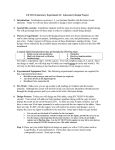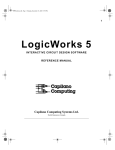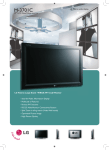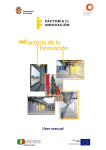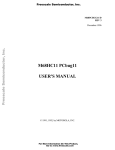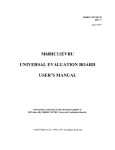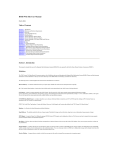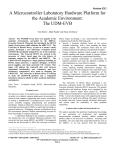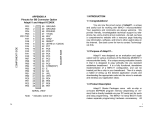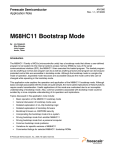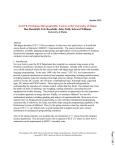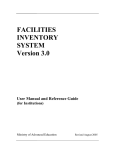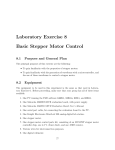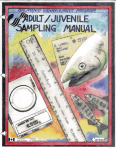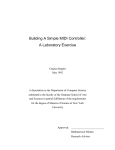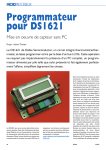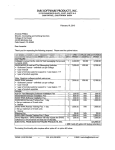Download eel 4744c: microprocessor applications
Transcript
University of Florida EEL 4744—Summer 1999 Revision 2 Department of Electrical & Computer Engineering Dr. Eric. M. Schwartz Professors in ECE SYLLABUS Page 1/8 14-Jul-99 10:52 AM EEL 4744C: MICROPROCESSOR APPLICATIONS http://www.mil.ufl.edu/eel4744/ INSTRUCTOR Dr. Eric M. Schwartz LECTURES LAB SECTIONS (NEB 251) BEN 319 Dr. Eric M. Schwartz 8752 M 9-12am (HC) 7558 Tu 5-8pm (KM) 7561 Th 1:30-4:30pm (DC) 392-2541 [email protected] Office Hrs: Tu & Th: 8:30-10:30am MWF 4rth period (12:40 p.m [not 12:30p.m.] – 1:45p.m.) NEB 100 7555 M 5-8pm (DC) 7556 Tu 8-11am (RC) 7557 Tu 1-4pm (RC) 8734 W 9-12am (HC) 7559 W 6:30-9:30pm (KM) 7560 Th 8-11am (KM) 7562 Th 5-8pm (RC) CATALOG DESCRIPTION Elements of microprocessor-based systems; hardware interfacing and software design for their application. Laboratory. COURSE OBJECTIVES (ABET Design Content 50%) The student will learn the functional and technological characteristics of microprocessor structures, memory components, peripheral support devices, and interface logic. Through laboratory experiments and textbook examples the student will learn how to integrate and apply microcomputer subsystems and components to common interfacing problems. The Motorola MC68HC11 microcontroller will serve as the vehicle for exploring these topics. TEXTBOOK Gene H. Miller, Microcomputer Engineering—2nd edition, Prentice-Hall, New Jersey, 1999. REFERENCES • H. Lam & A. Arroyo, Fundamentals of Computer Engineering, Univ. Copy Center, Gainesville, FL 1995. • J. Peatman, Design with Microcontrollers, McGraw Hill, New York, 1988. • G. Lipovski, Single- and Multiple-Chip Microcomputer Interfacing, Prentice-Hall, NJ, 1988. • K. Doty, Fundamental Principles of MicroComputer Architecture, Matrix Publishers, Inc., Oregon, 1979. OFFICE HOURS You may go to any TA available (in NEB 251), not just the one teaching your lab section. The instructors will hold office hours (as shown above) or by appointment. Please do not come at other times as the size of the class and other duties do not permit more flexibility. You are encouraged to use e-mail to communicate with instructors and TAs. TA Office hours in NEB 251 TA name office hour e-mail H. C. Lilly Rand Chandler Katherine Meiszer Daniel Copeland Mon, 3-4pm Wed, 2-3pm Wed, 8-9am M, 2-3pm [email protected] [email protected] [email protected] [email protected] MULTIMEDIA CLASS/AUDIENCE NOTES Audience notes are normally available from the University Copy Center (UCC) Monday mornings for that particular week’s (or more) classes. (UCC is located at 1620 W. University Ave., Gainesville, in the Gator Plaza on W. University Ave. The phone number there is 372-7436.) The notes consist of copies of the class overheads with space for note taking. Two versions of the notes are available: “Class Slide” (with 6 slides per page) and “Class Notes” (with 2 slides per page). These notes are not required but are highly recommended. Check the class web site for information on exactly when the notes are available. For optimal performance, read the notes for a class before that class and bring the printed class notes to class to augment the printed material with your own notes, when necessary. EXAM SCHEDULE The is no final exam for the summer semester. EEL 4744 Summer 1999 Exam Schedule EXAM Exam 1 Exam 2 DATE Thursday, 8 July Thursday, 5 August TIME E1-?? E1-?? LOCATION CSE A101 CSE A101 University of Florida Department of Electrical & Computer Engineering Page 2/8 EEL 4744—Summer 1999 Revision 2 SYLLABUS Dr. Eric. M. Schwartz Professors in ECE 14-Jul-99 10:52 AM HARDWARE PURCHASES • Motorola MC68HC11EVBU Kit [required] • Three-wire, RS232-compatible cable [purchase optional] • 5 Volt regulated power supply [purchase optional] • Wire-wrap tool [purchase optional] • Soldering Iron [purchase optional] The kits can be purchased in the UF Technology Hub’s Customer Service Counter for $68.11. The power supply and cable (each about $10) can be obtained at various places in town (NovaSoft, Electronics Plus, Radio Shack, WalMart, etc.). Radio Shack has a wire-wrap/stripper tool for less than $8, an outstanding price! You will need 2 standard 3.5” HD disks, one to hand in your working programs in lab. You must bring the kit to your first lab meeting (Lab 1). You only need to purchase (or manufacture) a power supply, cable and wire-wrap tool if you intend to work outside of the lab. In the lab, power and cable are provided for you. (Some wire-wrap tools are available in the lab, but it is not possible to do all of your wirewrapping and soldering in one lab period.) If you plan to purchase a cable, be sure to determine if your PC has a 9-pin or a 25-pin serial connector port. You may also need to purchase some additional ICs as the semester progresses. SOFTWARE PURCHASES LogicWorks™ (from Capilano Computing Systems) is now required for EEL 3701C and EEL 4712C, so many of you already have copies. Some EEL 4744C homework and laboratory assignments will require the drawing or simulation of logic circuits. LogicWorks™ greatly simplifies such assignments. Since LogicWorks™ will be useful in other ECE courses (EEL 4713, EEL 5745 and Senior Design), we recommended that you purchase a copy if you have not already done so. REFERENCE MANUALS (The Motorola MC68HC11 EVBU Kit contains the following manuals:) • HC11: M68HC11 Reference Manual, Rev. 3 • HC11: M68HC11E9 Technical Data or E-Series Technical Data • PCBUG11 User's Manual • Motorola Freeware PC-Compatible 8-bit Cross Assembler User's Manual • HC11: M68HC11E9 Programming Reference Guide [alias (the 68HC11) BIBLE] • MC68HC11EVBU User's Manual COURSE GRADE DETERMINATION Exams 2 @ 30% 60% (grade of 90 or better on the exam 2 results in ½ letter grade bonus, e.g,, B+ → A) Laboratory 30%* Homework 0%† (8 homework) (Pop) Quizzes 10% (5-20 quizzes) [Bring your BIBLE to class everyday for the possible pop quizzes.] Total 100% * A grade of 65% or better in Lab is required in order to obtain a passing grade. † Although HW does not count in your grade, not doing it will likely have an affect on your quiz and exam scores. GRADING POLICY All grades are non-negotiable one week after Grades if often distributed according to the following rough distribution: the grade is assigned. Please don’t come to me after the final grades have been posted A: 10% B: 35% C: 45% D&E: 10% with some hard-luck story. This usually works out to mean that if you make class average you will earn close to a “C+”. If you score 10 percent above the class average, you will probably earn a “B.” If you score 20 percent above class average, you will probably earn an “A.” This is not a contract on grading. Rather, this information serves to provide you a rough understanding of your academic standing at any time during the semester. After each exam, your current ranking in the class will be posted on the class web site under your code name (submitted with homework 1). There are no 90, 80, 70, etc., grade guarantees. Part of your grade on tests, quizzes, labs, etc. is based not only on solving the problem you are presented with, but the manner in which you solve it. For example, there is a difference between two programs that meet the given specifications, but one is an elegant, extensible 20-line solution, while the other is an obfuscated 100-line program that also meets the specifications but would be difficult to extend later. Just as your future employer would value the latter program less than the first, so will I in grading your assignments. University of Florida Department of Electrical & Computer Engineering Page 3/8 EEL 4744—Summer 1999 Revision 2 SYLLABUS Dr. Eric. M. Schwartz Professors in ECE 14-Jul-99 10:52 AM COURSE REQUIREMENTS 1. You must bring your “Bible” (Programming Reference Guide) to each class, since you may need it for a pop quiz. 2. Perform all laboratory experiments. • Labs must be done at scheduled times. • An average lab grade of 65% or higher is required to be eligible to pass the class! 3. Do all homework assignments. • Homework will be collected, but will not be graded. The gradebook will reflect submission and level of effort. 4. Take 2 during-term evening exams and a final exam. • No makeup exams will be given except for medically documented incapacity or family emergency. 5. Take 5-20 in-class, 10-15-minute quizzes. Some quizzes are scheduled; some may be surprises (pop quizzes). CHEATING CHEATING WILL NOT BE TOLERATED. You may talk to other students about homework assignments and labs, but the final work must be your own. If you are caught cheating on any assignment (homework, lab, quiz or exam), your score for that assignment will be a 0, and a meeting with the instructor will determine additional penalties, none of which are desirable or pleasant (i.e., cheating may result in your failing the course, being brought up on honor court charges, and/or expulsion). If you know some one is cheating, it is your responsibility to report it. We have and will continue to prosecute cheaters by turning them over to the office of Student Judicial Affairs. For more information about cheating, see the URLs: http://oss.ufl.edu/academichonestyfaculty.html and http://oss.ufl.edu/Academic_Honesty.html. We regularly catch cheaters. Don’t do it! WORKING TOGETHER You are encouraged to work with other students on homework assignments (absolutely forbidden on labs) in a professional manner. Each person in the group should attempt to solve all problems independently and only then discuss the results with one's partner(s) to correct errors and resolve differences. Copying your partner's work without a serious attempt on your part constitutes cheating and should not be permitted by your partner(s). Matching your solution to your partner's, however, is acceptable, if, after independent study and work you are convinced your partner's solution is correct. All solutions should reflect your style of problem solving, even those you have changed to match your partner's solution. In other words, verbatim copying or simple paraphrasing of your partner's solution is not an acceptable form of cooperative study. Your name and your partner's name(s) must be on your homework. You may not copy LogicWorks files, changing only the initials on your gates, and submit this as your own work. You must do independent work on labs. Although you may consult with other students, TAs, or Professors, you must do independent work. Consulting means “seeking opinions or advice,” not getting working programs or designs, understanding them, and then modifying them to make them your own. The latter constitutes cheating (see above section). Working side-by-side to construct a program or design in a group constitutes cheating. (Solving labs are good practice for solving quizzes and exams, which are also not group activities.) HOMEWORK GRADING Homework sets are assigned as shown on the schedule. Homework solutions for the entire semester are posted on our class web-site. It is not appropriate to copy the supplied solutions verbatim; this constitutes cheating. Homework sets will be collected but they will not be graded, but will be entered into the gradebook as 0 (no significant effort or not submitted), 1 (half-hearted attempt) or 2 (significant attempt). The final course grades will be assigned with strict cuts between grades, but HW could push you All grades are non-negotiable one week after above a cut. Also, the (pop) quizzes will come from the class material, the grade is assigned. Please don’t come to the labs, and the homework. In addition, the exams will be partly based me after the final grades have been posted on the assigned homework. with some hard-luck story. LABORATORY GRADING Labs 0 and 1 each count as ½ of the other labs. Grading emphasis will be placed upon your producing well documented, well structured programs that realize the functional requirements specified by the lab handout and the lab instructor. The remaining portion of your grade will result from observations by your lab instructor on such matters as your understanding of the lab, your lab techniques, your pre-lab preparation, your lab reports and your cooperation and compliance with the rules. Lab reports and/or software that are similar and/or identical to other student’s work constitute cheating (see above) and will be given as a minimum a grade of 0 and reported to the professors for further discipline (and may result in failing the course, honor court charges, or expulsion). University of Florida Department of Electrical & Computer Engineering EEL 4744—Summer 1999 Revision 2 Dr. Eric. M. Schwartz Professors in ECE SYLLABUS Page 4/8 14-Jul-99 10:52 AM All grades are non-negotiable one week after EXAM RE-GRADE POLICY the grade is assigned. Please don’t come to If you believe an error has been made on an exam score, you must make me after the final grades have been posted a written request to the instructor explaining where the misgrading or with some hard-luck story. error occurred. This request must be submitted immediately at the end of the class in which the exam is returned. If you do resubmit an exam, however, the instructor reserves the right to scrutinize and grade the entire exam more closely. This definitely places your current score at risk. Consequently, it is not advisable to resubmit an exam for correction unless a blatant error, such as a miscalculation of total points, has been made. You must make it clear what writing you added to the exam (by clear indication, e.g., use a different color pen or pencil) after it was returned to you. EXAM SOLUTIONS AND LAB SHELLS We will post lab, lab program shells and other class material on our class web site at: http://www.mil.ufl.edu/eel4744/, along with periodic postings of the class gradebook (without names). Solutions to the homework sets are already posted on our class web site. Previous exams on the course material will be posted on our web site. Current exam solutions will be posted near the lab the day the graded exam is returned to class. Some of these materials will be available for purchase at the University Copy Center (next door to the Florida Bookstore in the Gator Plaza on W. University Avenue). HANDOUTS If you miss a class in which a handout is given, you may pick it up on a table outside the Lab (we place additional copies there, but we cannot be responsible if students abuse the system) or obtain a copy from the class web site: http://www.mil.ufl.edu/eel4744/. Please do not ask an instructor or a Teaching Assistant for handouts! Most handouts will also be available from class web site. EEL 4744C READING ASSIGNMENTS = Miller HC11: M68HC11 REFERENCE MANUAL, Rev. 3 HC11: M68HC11 E SERIES TECHNICAL DATA M68HC11EVBU User’s Manual GM TOPICS Introduction, History HC11 elements, Architecture, Sim11, BUFFALO, 1, 2, 3, 7.1-3 Addressing Modes, Instructions, BUFFALO, Instructions Data Structures, Prog Structure, Address and Bus 4, 5 Timing Parameter Passing, SCI 7.10 Soldering, Wirewrapping, Interfacing (mem exp) 6.1-6.4, pg 402-405, 7.14 (w/o SPI), Parallel I/O, Handshaking, Resets, Interrupt 6.5-11; 7.3-6; 7.12-13, 7.15 Processing, IRQ, XIRQ Interrupt Processing, IRQ, XIRQ, Timer System, 7.7, pg 326-330, 6.12-14 TOI, RTI Reading Code: RM TD UM GM = = = Multitasking Output Compare, Exam 1 Output Compare, PWM, Input Capture Input Capture, Pulse Accumulator, A/D Conversion D/A and A/D Conversion, A/D Subsystem SPI Applications, Exam 2 Miscellaneous, Review Final Exam RM TD 1, 2, 3, 4, 6, 1-3, 4 A UM 1, 2, 4 5, 6 9 2.6-2.7 7 4.1 7, 5 6, 5 5, 10-10.2 9.1; 9.3.5, 9.3.9, 9.3.10, 9.4 Chapter 8 pg 336-346 10.4 pg 336-346, 329-336 10.4 329-336, 346-350, 7.9, 7.11 10.3, 10.6, 11, (12) 7.11 12 pg 398-403 8 9.3 9.3 9.2, 9.6 10 8 6, 3, A B University of Florida Department of Electrical & Computer Engineering EEL 4744—Summer 1999 Revision 2 SYLLABUS Page 5/8 Dr. Eric. M. Schwartz Professors in ECE 14-Jul-99 10:52 AM LABORATORY GUIDELINES LABORATORY OBJECTIVES The purpose of this laboratory is to teach students hardware and software development of microprocessor based applications. The laboratory complements the lectures by providing hands-on experience with microprocessors, peripheral devices and the required hardware and software development tools. EQUIPMENT REQUIRED 1. MC68HC11EVBU Kit (bring yours) 2. 5-volt regulated power supply (supplied by us) 3. 3-wire, RS232-compatible cable (supplied by us) LABORATORY PREPARATION All of the lab experiments require advanced preparation in the form of assembly language coding, simulation, computations and, of course, reading and understanding the lab handout itself! These preparations must be finished before admittance to the lab for that experiment and, usually, can be performed on a PC during the week other than at your scheduled lab time. Listings of pre-lab assembly language code must be in machine printed form and syntactically correct. For your own benefit, attempt to have logically correct programs before lab as well as syntactically correct code. LABORATORY ENTRY The TA's will let you in at the start of your lab period. Your TA has the right to kick you out of the lab if you are not prepared, i.e., you do not have a completed prelab. Your TA’s will check the following: • Show your assembly listing to your TA. • Load your code into a PC and show the TA that your code assembles properly. • Demonstrate your understanding of the code you brought and the lab topics in general. If you fail at any of the above, you will get a zero for the lab and will be asked to leave. You may not make-up this lab later. Therefore, it is imperative that you come to lab prepared! LABORATORY RULES 1. No food, no drinks, and no smoking inside the Lab! 2. Keep your work area neat and clean it before you leave. 3. Students must attend labs during their assigned time. 4. No extra time will be given for those who cannot finish the experiment in the stipulated time. 5. Labs are precisely 3 hours long (or less, see LABORATORY ENTRY above). You will be given no extra time. 6. You must show up within 1 hour of the lab starting time for check-in. (See above for check-in information.) LABORATORY ATTENDANCE Laboratory attendance during scheduled times is mandatory. Documented personal or family emergency will be accepted as an excuse for absence. In such cases, consult your instructor (not your TA) about a make-up lab during the same week. Students must make serious attempts on all labs. Grades less than 50% may be interpreted as not a serious attempt and will be scaled to 0. If you cannot finish the laboratory during the allotted time, you will lose at least 10% to 30% off your final score. In general, you are expected to finish the labs on time. LABORATORY REPORTS The answer to your lab questions, your circuit diagrams, and your printed listing of your code are turned in at the end of lab. [If any of the above is essentially identical to another student’s work, this constitutes cheating. If you are caught cheating, you will be given (as a minimum) a grade of 0 on this lab and reported to the professors for further discipline (which may result in failing the course, honor court charges, or expulsion).] You will also turn in your working disk at the end of each lab. This disk will be returned to you at the start of your next lab. University of Florida Department of Electrical & Computer Engineering EEL 4744—Summer 1999 Revision 2 SYLLABUS Page 6/8 Dr. Eric. M. Schwartz Professors in ECE 14-Jul-99 10:52 AM LABORATORY PREPARATION LIST 1. Always compose, edit, assemble, and print your programs before your scheduled lab. • This will save you considerable time and frustration and will improve your performance. In addition, you will have a legible working document. 2. Structure your program into functional modules and comment the modules as part of the coding. • Each subroutine should perform just one function. If a subroutine extends beyond 40 instructions, it is probably doing more than one function and should be split into two or more smaller subroutines. 3. Devise means for testing each subroutine separately so that problem isolation (debugging) is easily accomplished. Assemble the entire program using AS11 and obtain the corresponding “S19” file. • These tests should be made as part of your pre-lab preparation. 4. Simulate your program (using the “S19” file from Step 3 above) on SIM11 or debug is with BUFFALO before coming to Lab. Bring to your lab your working assembly code and LogicWorks™ circuit diagram file (if any) on a 3.5” HD floppy. (Bring a spare disk if you want to save your final solution, since we will keep your disk until your next lab.) Bring a printout of the list file to the lab. You will not be allowed in the Lab without this floppy and a commented listing of your code. 5. Arrive at the lab on time to give yourself adequate time. SUMMER 1999 EEL 4744C LABORATORY SCHEDULE LAB 1 START DATE Mon, 17 May 2 3 4 5 6 7 8 9 Mon, 24 May Tues, 1 June Tues, 8 June Tues, 15 June Tues, 29 June Tues, 13 July Tues, 20 July Tues, 27 July TENTATIVE LABORATORY TOPICS (Lab in NEB 251) Operating The MC68HC11 Under BUFFALO: Downloading, Debugging , Controlling A Robotic Platform (TJ Lab) Bus Timing using LSA Asynchronous Serial Communication (SCI) Soldering / Wire wrapping / 8-Bit Latch / Memory Expansion / LSA Parallel I/O, Input/Output Port Expansion, and SCI Interrupt system Raster Scan Input (Keypad) / Raster Scan Output (LED Array) Multi-tasking Output Compare / A-to-D Conversion Signal Timing: Input Capture / Pulse Accumulator EEL 4744C LAB SECTION INFORMATION NO 1 2 3 4 5 6 7 8 9 10 DAY Mon Mon Tues Tues Tues Wed Wed Thur Thur Thur TIME 9-12am 5-8pm 8-11am 1-4pm 5-8pm 9-12am 6:30-9:30pm 8-11am 1:30-4:30pm 5-8pm SECTION 8752 7555 7556 7557 7558 8734 7559 7560 7561 7562 TA LAB INSTRUCTOR H.C. Lilly Daniel Copeland Rand Chandler Rand Chandler Katherine Meiszer H.C. Lilly Katherine Meiszer Katherine Meiszer Daniel Copeland Rand Chandler University of Florida EEL 4744—Summer 1999 Revision 2 Department of Electrical & Computer Engineering Dr. Eric. M. Schwartz Professors in ECE SYLLABUS Page 8/8 14-Jul-99 10:52 AM EEL 4744C SCHEDULE: SUMMER 1999 (Part 2 of 2) WEEK/DAY 7 M 7 Tu 7 W 7 Th 7 F 8 M 8 Tu 8 W 8 Th 8 F 9 M 9 Tu 9 W 9 Th 9 F 10 M 10 Tu 10 W 10 Th 10 F 11 M 11 Tu 11 W 11 Th 11 F 12 12 12 12 12 M Tu W Th F DATE HW 28-June 29-June 30-June d:5,a:6 1-July 2-July 5-July 6-July 7-July 8-July 9-July 12-July d:6,a:7 13-July 14-July 15-July 16-July 19-July 20-July 21-July 22-July 23-July 26-July d:7,a:8 27-July 28-July 29-July 30-July 2-Aug d:8 3-Aug 4-Aug 5-Aug 6-Aug LAB # 5 6 6 6 a:7 No labs No labs No labs No labs a:8 6 7 7 7 a:9 7 8 8 8 8 9 9 9 9 No labs No labs No labs Quiz Class # 26-27 Comments Topic: Signal Generation & Output Compare System Topic: Output Compare System and PWM Topic: Input Capture System No Class Independence Day Holiday– No Class Evening Help Session: Periods E1-E2 in NEB 100. Topic: Applications of Microcontrollers to Robotics EXAM 1: Periods E1-?? in CSE A101. 23 Topic: Hardware and Software Debugging Topic: Exam 1 Solutions 28-29 Topic: A/D Conversion 31 32 Topic: Input Capture System Topic: Pulse Accumulator 33-34 Topic: A/D Conversion and Script files 35 Topic: D/A and A/D Conversion Topic: Catch up day 35 Topic: SPI Subsystem Topic: SPI Subsystem DROP DEADLINE (5:00pm) Topic: Miscellaneous Evening Help Session: Periods E1-E2 in NEB 100. Topic: No Class EXAM 2: Periods E1-?? in CSE A101. Topic: Miscellaneous








